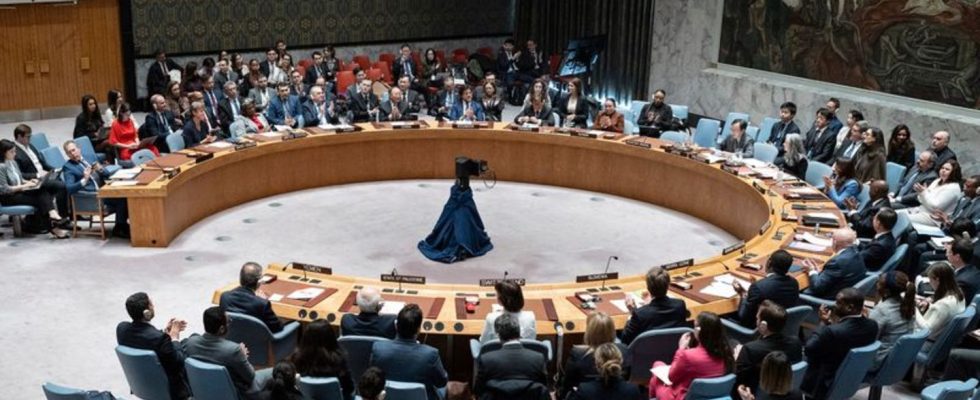After Iran’s attack on Israel, UN Secretary General Guterres urgently calls for de-escalation. Meanwhile, the tug of war over the hostages in Gaza continues. The news at a glance.
After Iran’s unprecedented attack on Israel, the Jewish state reserves the right to respond militarily. Iran has “crossed every red line,” said Israel’s representative to the United Nations, Gilad Erdan, at a special session of the UN Security Council in New York. According to his own statement, his country now has the right to retaliate.
However, the Israeli war cabinet has not yet made a decision on this after more than three hours of deliberations, the Times of Israel newspaper reported. Further talks should be held in the coming days, the news portal “Axios” also reported, citing an Israeli official. Several options for a possible retaliatory strike were discussed at the meeting.
Wildfire warnings in the Middle East
UN Secretary-General António Guterres called for urgent de-escalation. “The Middle East is on the brink of the abyss,” Guterres said at the Security Council meeting. “The people of the region face the real threat of a devastating major conflict. Now is the time to defuse and de-escalate. Now is the time for maximum restraint,” he said. “Neither the region nor the world can afford more war.”
The heads of state and government of the seven leading democratic industrialized countries (G7) strongly condemned the major Iranian attack and reiterated their full support for Israel’s security. “With its actions, Iran has taken a further step towards destabilizing the region and risks provoking an uncontrollable regional escalation,” said a joint statement after a video link of the G7 group convened by the Italian presidency.
For the first time in the history of the Islamic Republic, Iran directly attacked its declared arch-enemy Israel. Israel’s army reported around 300 rockets, drones and cruise missiles, almost all of which were intercepted. Iran portrayed the attack as retaliation for the killing of senior officers in Syria.
Air strike on Iranian embassy in Syria
On April 1, two brigadier generals were killed in a suspected Israeli-led airstrike on the Iranian embassy compound in Syria’s capital Damascus. Iranian UN Ambassador Amir Saeid Iravani said at the special session of the most powerful UN body that the Islamic Republic had exercised its right to self-defense: “These actions were necessary and proportionate.”
Israel’s representative Erdan countered: “We are not a frog in boiling water. We are a land of lions. After such a massive and direct attack on Israel, the whole world – and Israel most of all – cannot remain passive. We will defend our future .”
USA: Think carefully about risks of escalation
According to a statement from Washington, US President Joe Biden urged Israeli Prime Minister Benjamin Netanyahu to carefully consider a possible retaliatory strike against Iran and its consequences. Biden made it “very clear” to Netanyahu in a phone call that they needed to “think carefully and strategically about the risks of escalation,” said a high-ranking US government official in Washington. The USA, as Israel’s most important ally, had helped repel Iran’s major attack against Israel.
Iran warns of counterattack
Iran’s National Security Council warned Israel against a military response. “If the Zionist regime wants to continue its viciousness against Iran, it will receive a response that is at least ten times greater than the recent attack,” the Nur News portal quoted a council statement as saying. Iran chose the least form of punishment for Israel and only attacked military facilities.
Israeli army spokesman Daniel Hagari described the drone and missile attack on Israel as an unprecedented attack that was met with an equally unprecedented defense. “We remain on high alert and assessing the situation,” emphasized Hagari. “In the last few hours we have approved operational plans for attack and defense measures.”
Before the War Cabinet meeting, Israeli Foreign Minister Israel Katz said in an interview with Army Radio: “We said: If Iran attacks Israel, we will attack in Iran. And this commitment is still valid.”
Report: Hamas presents counterproposal for hostage deal
Hagari went on to say that Israel had not lost sight of its mission in the Gaza Strip to “free our hostages from the hands of the Iranian proxy Hamas.” Hamas rejected a compromise proposal from the mediators for a hostage deal. The Islamist organization and Iran wanted to cause turmoil in the Middle East, said Hagari.
Meanwhile, the Israeli newspaper Haaretz reported that Hamas had presented the mediators with a counter-proposal for a hostage agreement. This only provides for the release of Israeli hostages in exchange for Palestinian prisoners from Israeli prisons and a gradual withdrawal of Israeli troops from Gaza after a 42-day ceasefire, the newspaper wrote, citing Palestinian and Arab sources.
Calls for Israeli troops to withdraw from Gaza
The Israeli military would therefore stop fighting in an initial six-week phase and withdraw from the urban centers to the periphery of the sealed-off coastal area. At the same time, displaced Palestinians would be allowed to return to the northern Gaza Strip, it said.
During this time, Hamas wants to search for all hostages in the contested area and find out what condition they are in. In a second phase, Israel’s army would have to withdraw into Israeli territory. Only then would the exchange of Israeli hostages for Palestinian prisoners begin, it was said.
Israel’s leadership had previously assumed that just under 100 of the approximately 130 hostages remaining in Gaza were still alive. But now there are fears that significantly more could be dead. Israel wants to keep open the possibility of continuing fighting after a ceasefire.

